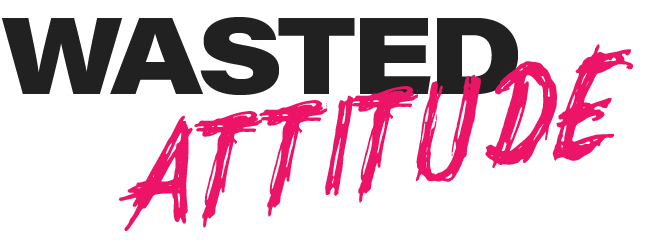Words: Miljan Milekić
Mery Muñoz is one of a kind. Not only that she is a world-class park rider with wins and podiums on major contests such as Winterclash, FISE World Series, or World Urban Games, but she’s also killing it in the streets, delivering top-notch video parts. However, she doesn’t stop there. With her project Rollsport Academy, she is there for kids, to pass on her knowledge to some future champions, but also to adults who want to get into inline skating. Rider, ambassador, and the one on the forefront of the blading culture, and we are happy to bring you her story.
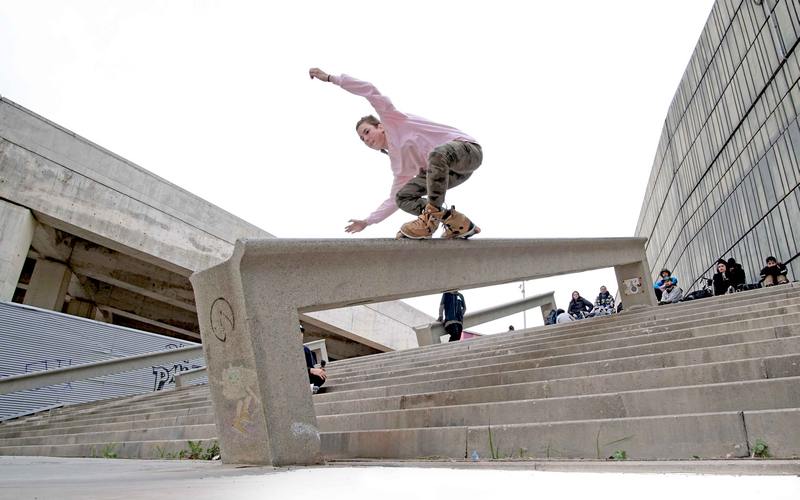
Hi Mery! How are you? What are you up to these days?
Mery: It’s been a crazy month for everyone, I guess. Especially mentally. It’s a lot of thinking, like what I’m doing with my life? (laughs) But, I discovered that since Monday, as an athlete, I have special permission to go out whenever I want, and not only from 6 to 10 am, and from 9 to 11 pm, so I can ride outside. It’s very intense in Spain right now.
You had a huge start of the year with the new part for USD. Can you tell me more about it?
Mery: Well, that video was filmed from September to December, more or less. Every year, I do a part for USD, and I wanted to do a street video I could be proud of. Instagram is cool, but I wanted to film for something in particular. I also have a clothing sponsor, and I was wearing these super fancy clothes. (laughs) So it was like a mixture of everything. The thing in Barcelona is that we are a lot of skaters, but when you go out to skate and film, you have t have someone you really know. So I skate, with Xavi Eguino. Right now it’s not possible, but normally I skate with him every day, I film him, he films me, and we are a team. Also, the rest of the Watermelon people, we’re always filming. So, in December, I just started to put everything together, and I was thinking I need the last trick. So, one day Xavi and I were on the scooter, and we saw these two kinked rails. And the next morning, we came back, filmed, and finished the video.
You have been with them for a while now. How did it happen, and how is it to be part of their team?
Mery: I’m very proud of being on USD because it’s one of the brands I always liked. I skated for Rollerblade for years, but I was trying to make a jump and produce freeskate media, because it’s something that I like, and it helped me to be in shape. There are some inline skating companies like Powerslide, who sell way more skates than USD, but as a freeskater, I think they are perfect for me. If I want to keep skating forever, I want to have something I could do until I’m 60, you know? (laughs) So in the beginning, I was in Rollerblade, and I made this first step in the freeskate. I wanted to progress as a rider, so things started to change. I wanted more from the brand, but it was not possible because they already had a lot of riders. They already had Coco [Sanchez] as a pro, so I knew I couldn’t ask for more. So, I was already in this freeskate mood, and I talked with Nick Lomax, he’s a good friend of mine, and I was like – “Hey, I wanna try to move to another team.” And USD was my favorite brand, I skated Carbons when they were still just a prototype like 8 years ago, I was already in contact with it.
I don’t remember the moment I officially joined, because at first, I joined Powerslide, not USD directly. I was focusing on Triskates because that’s what they wanted at the moment. They were doing this promo of the Triskates, so it was like – “Okay, let’s do this.” And I did this first Triskates video, and it got a lot of views on YouTube. So, Triskates were a way of coming to USD, and after a year, I started to be more officially in the team, as a flow. Since then, I’ve put in a lot of hard work. I went to a lot of contests, I also got the Federation to help me to travel to Asia to compete. Everything just started to make sense. So, it’s really been two years, and now we are doing a lot of great things. I’m very excited about everything that’s coming. I can’t say much of it, but I promise it will be cool.
You filmed the whole part in Barcelona, where you currently live. How did you get the idea, and what was your main motivation for doing it this way?
Mery: Well, I’m originally from Bilbao, and I think was twenty at the time, I moved to Barcelona for three or four years. But I worked as an unpaid intern for a producer, and I needed to move on. So I moved to Miami, for a year and a half, but it was very difficult for me, as a European, to live there. I was working, but I shouldn’t be working, and I had to come back to Spain every three months. It was a mess. (laughs) And when it turned out that I’m not going to live in Miami anymore, it was super-clear that Barcelona was the place. It is the best city to skate. It’s sunny all year, there are a lot of good riders you can meet, and to get the motivation from, which is very important to me. So, it’s full of riders, perfect for filming, I just figured that this was the city I wanted to be in. If you are inline skater, skateboarder, BMX rider, or whatever, this is THE city.
You’re not the first person to say that, I know so many people in extreme sports from all around the world that choose to live there. What’s so special about the city?
Mery: We say it’s like the skate Mecca. (laughs) It was even better when I first moved here because the police were super-chill, and they didn’t have problems with riders. And it got more crowded over the years. I would say it’s the climate and all of the spots. They are also building a lot of concrete skateparks outside of Barcelona, and the World Roller Games were this year. It’s like a sports city, I think. Also, there is a company here in Barcelona that teaches skateboarding, scooter, and inline. I’ve been in contact with them, and every time I wanted to try to live off the inline skating, I could always go to this friend, and work with him, teaching in school. So, another thing is that in Barcelona, there’s a lot of teaching inline skating at schools. I’ve seen it in other cities like Bilbao, but not in every school. Here, nearly in every school, you have something related to wheels.
As you said, you’re originally from Bilbao. How different is the blading scene in your hometown?
Mery: I would say that in Bilbao, they put more money in urbanism, it’s a very well treated city. But, related to inline skating, my friends, they’ve been working for nearly ten years on the design of an inline skatepark. Like a wooden skatepark with perfect copings and everything. And two years ago, they managed to build it. They came together as inline skaters, founded a club, Bilboblader Kluba, made a project, and sent it to the Government of Biscay, and nowadays they have this super great skatepark. Check it out if you can, because, for rollerbladers, it’s maybe the best skateboard in Spain. That’s the only thing about Barcelona – we only have concrete skateparks. They don’t really ask us what we want, they just build them.
You ride with an amazing style and flow. Do you listen to any music while you’re riding, and what do you listen to in general?
Mery: I love listening to music while skating, especially when I’m cruising the city with the big wheels. I listen to techno, or this very bad Spanish rap-trap music, but just to get in the mood. (laughs) But normally, in sessions, as nearly all of my friends are like me, we bring a speaker. I’m a techno lover, and my friends are more into rap, but I like it. And you know, if we’re having like a session at the Forum ledge, or even some little ledge in the streets, we always put this music, and it really motivates us. And that’s what we do. We’ll just put the speaker out and make it like a little party. Roller party. (laughs)
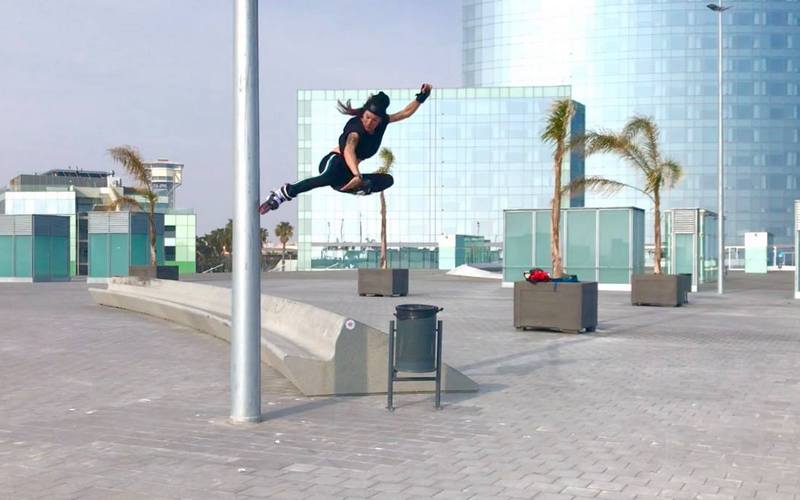
In recent years, extreme sports have been much more accepted into the mainstream, with skateboarding, BMX, and surfing even becoming part of the Olympics, while there are talks about inline being in Paris 2024.
Mery: Yeah, it’s been proposed, but we don’t know if it was accepted or not. But I wish it will be, my last goal in rollerblading would be going to the Olympic Games. Just imagine.
So, I wanted to ask you for your perspective, how do you feel about extreme sports becoming part of mainstream sports events and the Olympics, but I guess you just answered.
Mery: I’m going to talk in the first person because a lot of people like – “No, we want to keep it underground.” But that’s not my opinion, although I do respect the people who think like that. In my case, if it wasn’t for the Federation, I wouldn’t have traveled to China three times, or Japan. So, it’s helping me, and it’s helping this sport grow, and the kids are seeing the sport in another way. Not as, you know, these kids doing crazy things in the street and getting into problems. It’s not that anymore. At least in Spain, they go to the skatepark, and it’s almost like they go to a football court, you know? So the good thing is that now the parents are getting into the sport, and if the parents are in it, the kids will stay. I don’t know for your generation, but in my generation, a lot of parents were like – “No!” (laughs) Like, taking the skates and putting them in a closet, so we don’t find them, and we don’t go out. And it wasn’t my case, but my best friend, it always was like that. It was funny. (laughs) And now, the parents are super into the sport. They really want to push the kids, some of them come to me and want me to train their girl or boy.
It has a lot of positive influence on the future, but we have to be very careful because we must not let to lose the essence of the sport. Usually, we meet our Friends in the skatepark but I just can’t stop riding street. If I do that, I feel like I’m disrespecting the sport. As I said in the first question, about the video, I needed it to do it for myself, but also for the people to see it. I feel this little pressure to show people that I’m still riding street. I’m doing contests, I’m doing freeskate, I’m doing camps and everything, but I’m staying true to myself and doing what I like, which is riding and filming street and rails and all. So, I think it’s positive that the sport can grow. But also, I think it’s our responsibility to show to the kids that this sport is not only what they see in the park. It´s vert, its miniramp, its creativity, it’s mushroom blading, it’s going fast, it’s searching for your own taste, creating a unique style, it’s making friends worldwide and getting to know their cultures… it’s so many things… So we need to open the minds of young kids because if we don’t, they will only do what they see and be like robots. We don’t want that.
In recent years, It felt like inline was often overlooked, and in the shadow of skateboarding or BMX, for lack of a better word, like it stopped being “cool.” However, I feel like things are changing, and blading is slowly getting more and more traction. Would you agree to that?
Mery: Well, I think the sport is in a good moment. Even with this Coronavirus situation, which is very sad, our sport is coming back. People want to do sports, they want to be fit, and they are buying inline skates and go skating. And, I know what you mean about people saying that it’s not cool and all that, but I think it’s a matter of sponsors. Like, Vans were there for the skateboard scene, but they weren’t for us because we have our skates and don’t wear shoes. Maybe it’s as simple as that, I don’t know. I wouldn’t say it’s not cool, I would say it didn’t have the correct attention at the moment. And now, I think we are getting it back. I hope that one day we can be on the same level as skateboarding or BMX. But in the end, it doesn’t matter if people say it’s cool or not. For me, it will always be cool.
And one more thing. For example, I come from a family with three girls. So, if I wanted to give my skates to my little sister, we have to wait for years until she can use them. And in these three, four years, she grabs a skateboard. We have sizes, while skateboards and BMX bikes are more universal, more likely to be shared. You can’t just give your skates to someone to try them, like you can with skateboard or BMX. So I think it’s the mixture of the sponsors and the lack of the ability to share that easily.
I never actually thought of that, but now you said it, it makes a lot of sense.
Mery: But we are cooler, don’t forget that. We can fly higher. (laughs)
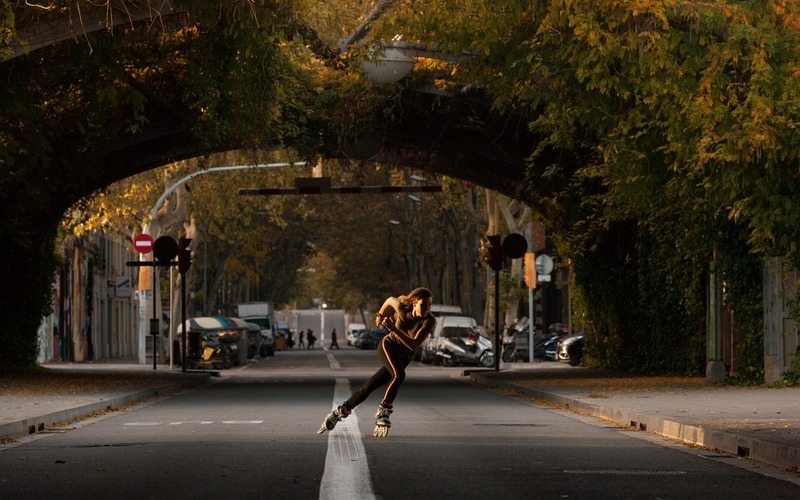
In the last couple of years, there has been huge progress in the world of women BMX, and women skateboarding. Female riders have got a lot more attention, their class at most events, equal awards on some contests, and in general, it’s been much more widely accepted. Consequentially, it resulted in great progress in the riding itself. Is it something that’s also happening in rollerblading? How do you see women blading at this point?
Mery: If we compare ourselves to BMX and skateboard… These last few years, I’ve been traveling to FISE World Cup, and I’ve been seeing how girls in skateboarding and BMX socialize, and how organized they are because of the Olympics. They are on another level. So, it’s very interesting to talk and to share knowledge with them. Like, in Barcelona, for example, skater girls have their own magazine, Asiplanchaba. And the BMX girls have their system to be notified about training sessions, changes in schedule, and stuff like that at contests. Which I find super nice. It´s actually one of the girl’s mom that helps organize the chat. As for inline skating, it feels is like it’s me and Manon Derrien traveling with the boys. Chihiro [Azuma] and Misaki Takayama sometimes join for the World Cup. We don’t have a way of sharing experiences from girl to girl as a magazine or an organization. We need to organize ourselves better and contact more people, so we can do more things and be more visible.
Basically, to create a community and create a network.
Mery: Yes. We are pushing it. We have The Bladies, which means a lot to us. I’m running Bladies TV, Melissa does a lot with Rollher United, Megan with The Bladies, Acid Bladies in Colombia… So, we are doing our stuff, but it’s us, it’s a few girls. If more of us get involved, we can start conversations. For example, we could go to a contest and say – “We don´t compete if the contests it’s not LIVE.” You know? We need this power to really change things.
Like BMX girls did with the X Games.
Mery: That’s it. Yeah, when they refused to ride a demo. I look up a lot to the BMX girls, but also they are good friends of mine. And they see that inline skating is not so big. They were always telling me that we need a group at all the contests, to be aware of the Schedule and the conditions. Nowadays, it’s not like this, but in the past, I remember going to the FISE and having to compete at eight in the morning. The female contest was at eight in the morning. (laughs) Come on! No one is going to watch it! But now, in Montpellier, for example, we have Priscilia, the girl that has her own inline school, and she’s doing a lot in France. But we are moving forward. It’s not that we are going back or anything. And the prize money, some of the contests, like the one in Budapest last year, it was equal, but it’s not very common. When it’s, it’s like – “Wow!” (laughs) Thanks to the contest in Budapest, I’ve been able to live until a few months ago. Imagine If we could have that at every contest.
We were there actually, it was World Urban Games in Budapest, but our ride was late, and we missed all the contests on that day. We only got to see the BMX.
Mery: No! It was one of my favorites last year. They treated us like real athletes. I was shocked. (laughs) The food was very good, all the food you want. (laughs) We had drinks, massages, a shadow from the sun. You could chill in the shadow, and had like water, pineapples…You know, it was awesome. For me it was, amazing. I love food. (laughs)
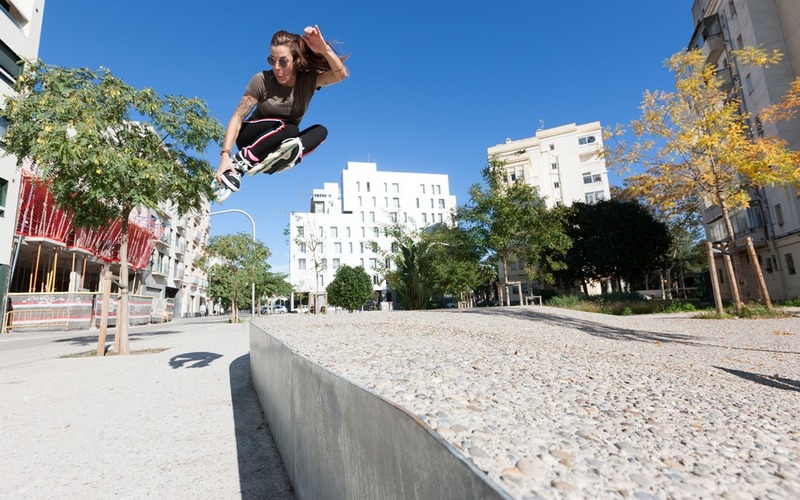
I know you’re a big fan of Winterclash. How important is it, for the sport itself, to have an event like that?
Mery: The thing I like the most about the Winterclash is the joy I and other bladers feel being there. Also, they are always open to new ideas. In the last few years, there have been panel discussions, there were schools, which I participated in. It’s made by bladers, for bladers, and we know what the sport needs. For example, they asked us what we wanted them to do with the royalties from last year, and everyone was like – bring pro skaters. Like, for me, meeting Fabiola [da Silva] was something huge. And, year or two before, years ago I saw [Chris] Haffey. Bringing pros, making the kids want to be there, and getting them excited about seeing their favorite skaters.
And all the panel discussions are doing a lot for the sport. If you go to a contest, you compete, and when it’s finished, you don’t take anything from it. It’s just a contest. But if you do a contest, and also get the pros to talk and to share the experience – to talk about injuries, or retired pro riders sharing how they did it… I was learning from them. People can learn a lot of things just by being there and listening to Fabiola, to Jenna [Downing], Chaz Sands, Brian Aragon… So why is Winterclash so big? Because we make it big. And one little thing – in the last few years, I was super down to the content and everything, but after winning it for the second time, this year, I was in the mood where the contest wasn’t the most important thing I was doing this weekend. Now, I’m thinking of it more like a meeting place to see everyone. It’s just amazing.
So, what are your other favorite events, besides Winerclash?
Mery: Four years ago I went to Pow-Wow in Florida for the first time. It was super cool, but I got injured in the finals. So it was cool, but this year, I really enjoyed just being there, the camping and the vibe. It’s not a contest vibe, it’s more like, everyone camping together. I really enjoyed going to this contest, I wanted an event where I could chill and just enjoy. I’m a fan of Ghetto Games, as well. I used to go there, and it was super cool. The country is very interesting, people are super-nice, and the food is very cheap. They treat you very good, as well. They offer you accommodation and take you out. So it’s a nice contest to enjoy, as a rider, but also as a tourist. Why not? (laughs)
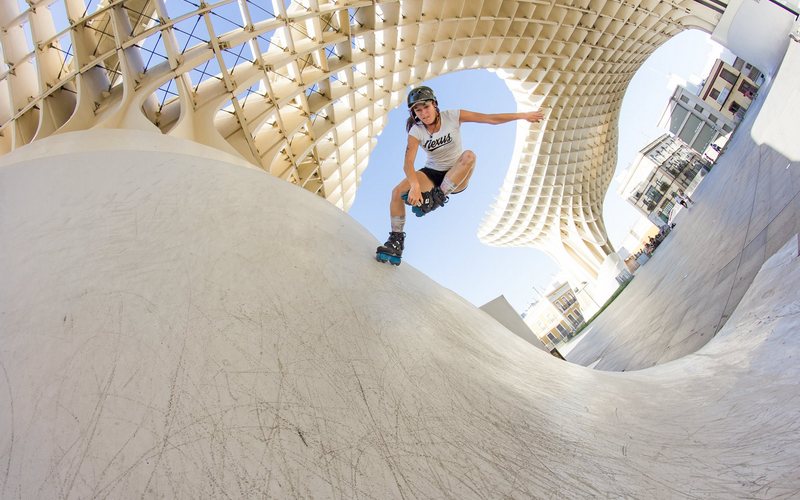
One of your main projects at the moment is Rollsport Academy. Can you tell me more about it? How important was it for you to be part of something like this?
Mery: The thing that I learned from a lot of pro skaters, is to think about what comes after you stop doing like the hammer tricks and all that. So, the first idea that comes to mind is that I finish my studies, and I know I can do something else. But I really want to have my skates on my feet forever. So, I started teaching in schools, and I worked in a lot of places. After three or four years, I knew I was enjoying teaching kids, but I wasn’t enjoying not being able to pay my rent. (laughs) So, I knew I wanted to continue to work with kids, and I decided to make something solid from it. I finished a course where I learned more about teaching in a very basic way and doing it safely. Which is cool because, well, we need it. (laughs)
So, after I got my certificate, I stopped working for the company and started giving private lessons while I studied a course at Enterprising Women in Barcelona. At first, I started giving private lessons in skate parks, or just on flat ground, and then everything started to evolve. I started to work more with Blading Camp and do more coaching. So, I needed to put a name on it, and after thinking and designing, I did this little logo – Rollsport, I made some T-shirts and opened the club. I did the paperwork for the club because that’s the legal form for the school. So, last summer, I decided to do the first Rollsport Camp. There weren’t a lot of kids, but it was a very good experience for me and for them. To learn how to do the camp, to be in charge, with someone else as a helper… For example, in Barcelona, you have to be very careful with the sun, last year I didn’t do enough aquatic exercises, so now we have to do more…
Now, what I want to do is group lessons in the skate park every Saturday. I was doing that until the Coronavirus came. Just before the lockdown, I had one of the biggest classes, and I had to cancel it. There were eleven or twelve adults. So, that’s also a thing. I started with kids, and suddenly, a lot of people on Instagram started asking me if I work with adults. So I started doing that too, and it was working. I was finally on track because I started with the official Saturday classes in January. Everything has been growing, and we got to this point, and it was super cool. Also, I was going to start to organize little events with people from the other clubs in Barcelona. So Rollsport is a lot of things. Sometimes, I don’t know how to describe it, because it is a school, but I really want to do more with it. I want to do camps, school, I want to do tours in Barcelona… So, the idea of Rollsport is to have a plan B for my life, in skating. For me, as a professional skater, it’s the best way to keep a solid base, to keep training, to keep rolling. Not having to do another job as a waiter, or anything else I don’t like. To stay fully in inline skating.
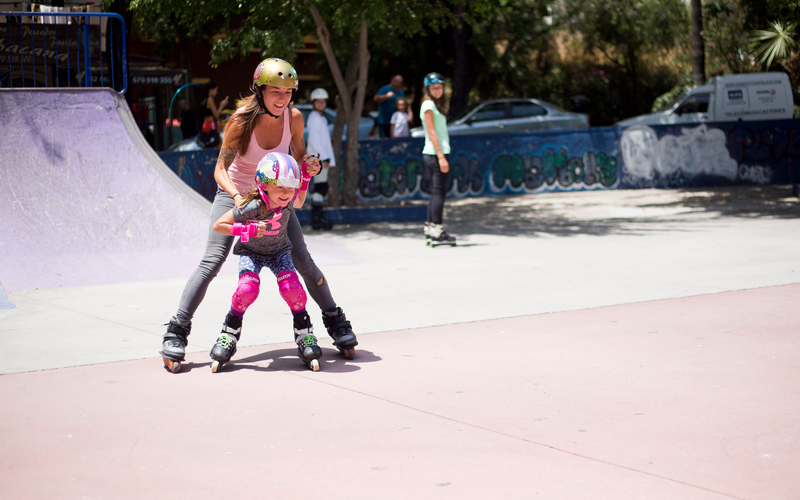
So, I don’t know if there is much point in asking you this, but what’s in store for you in 2020?
Mery: So for the last three years, I was in a contest mode from May to November. It’s all contests and traveling. So this year, I’m super relaxed, and I’m happy because I’m going to be able to spend more time here in Barcelona and film. That’s what I’m going to do all year because we don’t know what will happen, and we can’t make plans for contests. At the beginning of the year, I had a moment of panic, my mind was going crazy. Like, what am I going to do, what am I going to live from if I spend all my money until the middle of the year? I was going to go to FISE Hiroshima in Japan, and I calculate my year and build my shape for the big contests. I was making my mind, and suddenly the Federation told me they are not going to buy me the ticket, because of Coronavirus. And at that moment, the virus was only in China and Japan. So I was like – “Should I just buy my ticket and go?”
I was going crazy. Really. I was too intense. And the moment everything started to go crazy and the frontiers got closed, I was like – “Okay, forget about contests, take it easy.” I don’t really enjoy that much being in a contest mode forever, I’m more chill. I know a lot of good things are coming from USD this year, so I will focus on filming. And whenever we are able to travel, I will try to travel, of course. My plan was to try to make it to Woodward in September. But it’s okay. As I was talking with other inline skaters, we are lucky that our job is not relying on a gym, or like a football pitch. We are free. We have a sport that is like art, it’s everywhere. (laughs) So, I’m positive about this year. Everyone is going to chill out a bit, without the contests. Also, now the FISE Montpellier is doing an online contest. They did that some years ago. It’s like a video contest, you film some tricks and send it. I don’t know, what are they going to ask for this year, but that’s one of the things that is motivating me. Okay, we don’t have the contest, but we can film, and I love filming. So, ha! (laughs)
So, now you can go out, are you going to retire the pole on your balcony?
Mery: It has given me a lot of happiness in these months of lockdown and I was skating it a bit even after my outdoor sessions. But my neighbors already called me out, so I will leave it just to watch and imagine tricks….
Follow Mery Muñoz:
Facebook: facebook.com/munozmery
Instagram: instagram.com/mery_munoz
